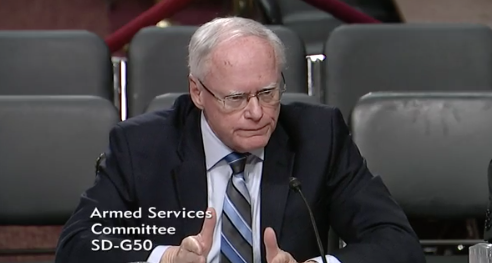
James Jeffrey, a former US ambassador to Iraq and Turkey, testifies before the Senate Armed Services Committee on Dec. 14, 2017. Screenshot photo from SASC video.
US strategy in the Middle East is facing a critical moment after the defeat of ISIS, and a continued military presence in both Iraq and Syria will be crucial to achieving the US goal of stable governance throughout the region, US ambassadors formely serving in the region told Congress Thursday.
“We are at a strategic inflection point with the military defeat of the Islamic State,” Ryan Crocker, a former US ambassador to Afghanistan, Iraq, Pakistan, Syria, Kuwait, and Lebanon, told the Senate Armed Services Committee. “The military defeat is necessary but not sufficient” for stamping out violent extremists in the region.
Groups like Al Qaeda and ISIS “are not in and of themselves the problem,” Crocker said. “They are the symptom of the problem. The problem … is the failure to establish good government” in places like Iraq. He warned senators that “the underlying issues of governance…are still untreated,” and if they remain unaddressed, “you’re going to see a successor to Islamic State.”
The threat of a return of violent extremism is tied to the other major threat in the region, the malign influence of Iran. Tehran “doesn’t challenge conventionally,” but instead it “infiltrates other countries, playing off bad governance,” and foments the growth of radicalism, said James Jeffrey, a former US ambassador to Iraq and Turkey.
Jeffrey said the Trump Administration has shown little stomach for confronting the Iranian threat head-on. “While this administration has a very tough rhetorical position against Iran,” he said, “it has done very little on the ground in the first 10 months to stop further Iranian successes.”
The most important thing the US can do is to keep US troops on the ground to “help our Syrian allies…hold strategic territory that’s been liberated from ISIS control,” said Eric Edelman, a former US ambassador to Turkey. “We can and should exploit Iranian over-extension there,” Edelman said.
Today, Iraq and Syria represent “the central front in stopping Iran,” Jeffrey agreed. “Our presence in these areas is very, very important,” he said. But equally important is articulating “a comprehensive plan to deal with Iran” and convincing US allies in the region “we are in the lead and we know what we’re doing.”
Long-term, Jeffrey said US presence in the Middle East should be shaped by “economy of force, light footprint operations with our allies.” These kinds of operations will be necessary to create and sustain stability in the region, but “there’s nothing easy about this,” Jeffrey admitted. Such a strategy “will produce new Beghazis and new Nigers,” but the US “will have to be able to move on and not melt down when these things happen because this is the right way to approach it.”
